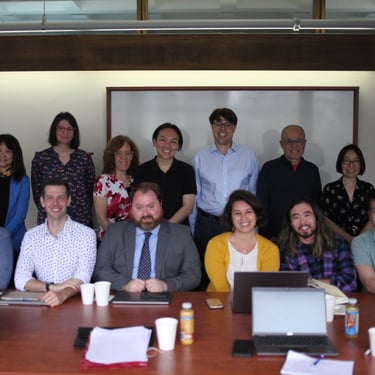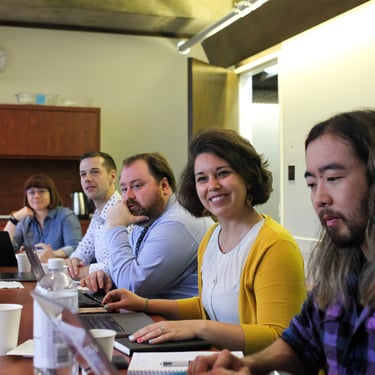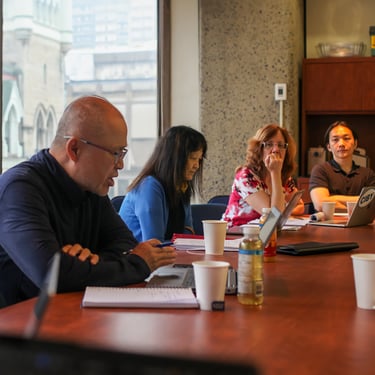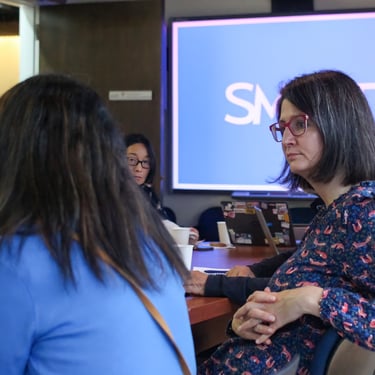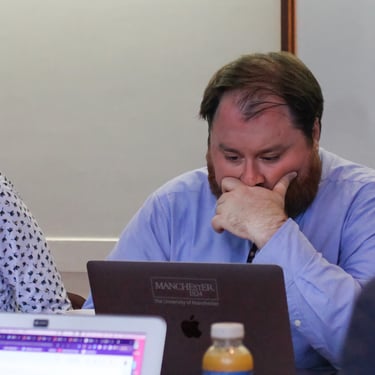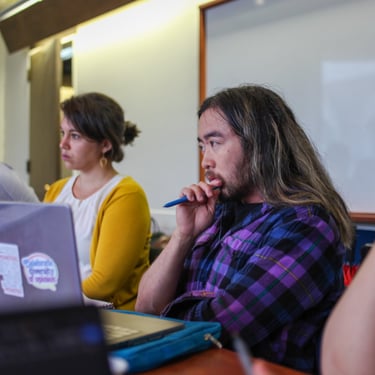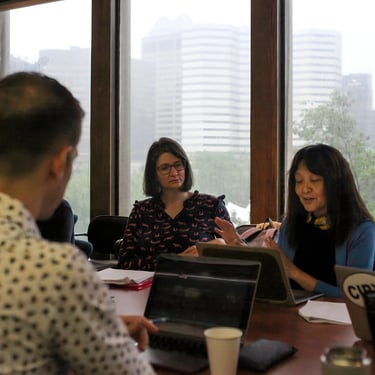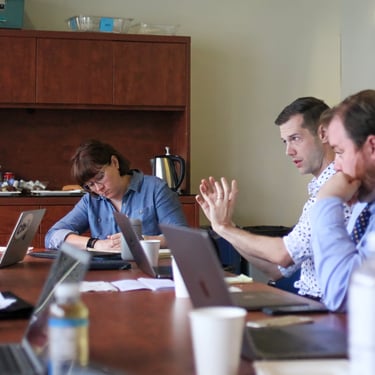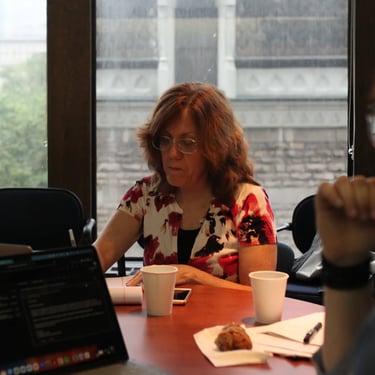
Past Events
2024
New Research on Early Imperial China
The Annual Meeting of the Canadian Historical Association
Location: McGill University, BRONF 210
Date: June 18, 2024. 13:30 - 15:00 (EST)
Registration: Not Required
Chair: Griet Vankeerberghen
Xinyu Zhang, Toasting Ritual and Hierarchical Relationship: A Case Study of Chancellor Tian Fen’s Feast in Han China Ruoxuan Wen, Family Structure, Legal Implications, and Governance in Eastern Han Changsha: A Study Based on the Wuyi Square Slips Frank Xuanyun Gong, The Changing Political Climate and the Memory of Early China
Canada, the United States, and an Ascendant China
Conference
Location: The Intercontinental Hotel, S. Bernhardt Room, 2nd floor, 360 Rue Saint-Antoine O H2Y 3X4
Date: May 10, 2024. 09:00 - 19:00 (EST, Coffee and Refreshments 08:30)
Registration: Required (here), Participation is by invitation only, and free of charge, but space is limited.
For its second annual Slater Family Policy Series, the Max Bell School of Public Policy at McGill University, in partnership with the Washington-based Wilson Center, is hosting a conference in Old Montreal titled Canada, the US, and an Ascendant China. This one-day conference will examine ways in which Canada and the United States can work together in responding to the challenges and opportunities associated with China’s rise on the world stage. During a period of heightened international complexity and instability, including renewed geostrategic rivalry, Canada-US cooperation in managing their respective relationships with China will be more important than ever.
For more information concerning the conference, please visit the registration site here.
EAST 303 Chinese Drama - Final Performance Project
Location: Morrice Hall Tuesday Night Café Theater
Date: April 8 2024 (Monday) 18:00-20:00 (EST)
Registration: Not Required
The program will include performances based on premodern and modern Chinese dramas, including: The Injustice to Dou E (13th century), The Orphan of Zhao (13th century), Farewell My Concubine (early 20th century), and Thunderstorm (1932).
Slaves of the Emperor: Service, Privilege, and Status in the Qing Eight Banners
Book Launch
Location: ARTS W-120, Arts Building, 853 Sherbrooke St W, Montréal QC H3A 0G5
Date: March 25, 2024. 17:30 (EST, Reception: ARTS 160, 19:00)
Registration: Not Required
Presenter/Author: David Porter (McGill)
Discussants: Jonathan Harper (McGill), Guojun Wang (McGill), Griet Vankeerberghen (McGill)
"Be Yourself": Why Does a Working Holiday Visa Facilitate Chinese Youths in Developing a Sense of Self and "Protecting the Light of Our Soul"?
Location: Virtual (Zoom Link: https://concordia-ca.zoom.us/j/87086000893)
Date: March 20, 2024. 20:00 (EST)
Registration: Not Required
Presenter: Qing Tingting Liu (State University of New York at Albany)
Chair: Yige Dong (State University of New York at Buffalo)
Discussants: Fran Martin (University of Melbourne), Yaotai Li (University of New South Wales, Sydney)
Abstract: This research on Chinese Working Holiday Makers in Australia contributes to the cosmopolitanism debate, examining whether it is an exclusive privilege for global elites or a shared identity among peripheral groups. Utilizing one year of lived experience (2017-2018) and in-depth interviews from May to August 2023, I’ve noted the working holiday program’s role as a “cultural policy,” fostering a “cosmopolitan imaginary” among Chinese youth. Paradoxically, this pursuit exposes them to constraints, precarity, and exploitation in Australia. I argue that their vulnerability extends from the liminality experienced in China, revealing transnational class dynamics. This research enriches the discourse on transnational youth mobilities by focusing on the context of their home country. Lacking “common sense” in political, workplace, and gender domains, these youths feel alienated in mainstream Chinese society, disenchanted with the “Chinese Dream.” Their regional identity stigma tied to Hukou intersects with gender, class, age, education, and sexual orientation. Thus, they acknowledge that the working holiday visa offered them a vital “space,” physically, socially, mentally and psychologically, to “be yourself,” value their bodies, emotions, and feelings, pursue diverse lifestyles and workstyles, and “protect the light of their soul.” As aptly expressed by one participant: “While a replanted tree can die, humans who relocate can thrive—树挪死人挪活.” This recognition also affects how they perceive race and racism in Australia. Overall, this study challenges stereotypes of hyper-nationalistic Chinese diaspora, examining their nuanced, individualized connections with their home country through the exploration of the debate between nationalism and cosmopolitanism.
THiS (时间社) Workshop
Liberal Agentic Citizenship, its Global Reach and Limitations: Europe and China Comparisons
CSDC Workshop
Location: Ballroom, Thomson House, 3650 Rue McTavish, Montréal, QC H3A 1Y2
Date: February 16, 2024. 15:00 (EST)
Registration: Not Required
Presenter: Yasemin Soysal (WZB Berlin Social Science Center, Germany)
Abstract: Since the 1990s, global cultural shifts driven by neoliberalism have ushered in significant changes in the institutions of citizenship. This has given rise to an increasingly agentic conception of the individual, with strong meritocratic ideological underpinnings manifested across a wide range of policy and institutional domains. While the normative foundations and the institutional embodiment of agentic citizenship are widely studied, we know less about the individual enactments of such citizenship. Drawing from data collected through a unique, representative survey I will present comparative evidence on agentic and meritocratic orientations and their implications for solidaristic inclinations among higher education students in China and Europe.
Cooperating to Resist: Society and State during China's COVID Lockdowns
Location: Virtual (Zoom Link: https://concordia-ca.zoom.us/j/87086000893)
Date: February 14, 2024. 20:00 (EST)
Registration: Not Required
Presenter: Shitong Qiao (Duke University)
Chair: Zhifan Luo (Concordia University)
Discussants: Sida Liu (University of Hong Kong), Dali Yang (University of Chicago), Yueran Zhang (University of California Berkeley)
Abstract: The Chinese Communist Party (“CCP”) claimed that China’s fight against covid demonstrated the strength of the party-state’s institutions. Critics pointed to the prevalent violation of individual rights and numerous individual sufferings in China’s lockdowns both in Wuhan in 2020 and in Shanghai in 2022, and beyond. Both views take the party-state as the only player that mattered in the largest lockdowns in human history. Nobody has examined the role of the society in China’s covid lockdown, except for the Chinese official narrative of “the people’s war” which emphasizes how the party-state was able to mobilize hundreds of millions of volunteers in its fight against the covid, raising a question about the autonomy of civic organizations, and whether they played any role in monitoring and resisting the party-state’s encroachment on individual rights. Based on in-depth fieldwork including over ninety interviews and neighborhood visits in Shanghai, Wuhan, Shenzhen and Zhengzhou, this article reveals the state’s limited capacity to enforce neighborhood lockdowns, implement mass covid tests and provide food to neighborhoods under lockdowns. The cooperation of citizens, particularly homeowners, was essential to the state in maintaining its covid control system. When such homeowners, who were cooperators of the government, protested by law, the government had no choice but to give in. Dependence brought power. Neither the government nor homeowners were free from the constraints imposed on them by each other. The Chinese case demonstrates a new paradigm of state-society relationship that I call “cooperating to resist,” challenges our understanding of power and legality in authoritarian regimes, and sheds new light on the relationship between property and sovereignty, specifically why and how property law provides a safe space of resistance for citizens in an authoritarian regime.
THiS (时间社) Workshop
Sinophobia on Western Social Media During Early COVID-19
Location: Virtual (Registration Link: https://yorku.zoom.us/webinar/register/WN_qM9k1xGpTsSlvogNVepbHQ#/registration)
Date: February 9, 2024. 13:00 (EST)
Registration: Not Required
Presenter: Yongjun Zhang (Stony Brook University)
Chair: Cary Wu (York University)
Discussants: Zhifan Luo (Concordia University)
Abstract: The COVID-19 pandemic has led to a global surge in Sinophobia. This talk introduces two unique datasets that we collected to study how different communities reacted to COVID-19 on Twitter during the early pandemic. First, I show that Sinophobia or hate speech targeting Asians, Asian Americans and Pacific Islanders (AAPI) in online English communities was ubiquitous by mining over 68 million English Tweets we compiled using relevant keywords. This multiplex anti-AAPI Hate Speech data consisted of four aspects including COVID-specific hate, anti-Chinese politics, general AAPI hate, and counter hate. Second, I show that Sinophobia was also popular in Chinese language communities on Twitter by mining over 25 million Chinese tweets mentioning any Chinese characters related to China, the Chinese Communist Party (CCP), Chinese, and Asians after the COVID-19 outbreak. I show that the majority of these tweets were negative toward China, and they were targeting the Chinese government and CCP. Both datasets are available to scholars, and we call for more collaborative research to study the causes, consequences, and patterns of anti-Asian/Chinese sentiments online.
Presenter’s bio: Yongjun Zhang is an Assistant Professor in the Department of Sociology and the Institute for Advanced Computational Science at Stony Brook University. His main research interests include computational social science, political sociology, organizational studies, and demography. His current projects combine big data with computational, statistical, and network methods to study mobility, segregation, and polarization in the US. and across the globe. His work has appeared in various journals such as American Journal of Sociology, Demography, Scientific Reports, and Nature Humanities and Social Sciences Communications. He teaches research methods in sociology and introduction to advanced computational social science courses at Stony Brook.
Embedded Dilemma of Visibility: Navigating Feminist Activism and State Violence in Post-2010 Digital China
Location: Virtual (Zoom Link: https://concordia-ca.zoom.us/j/87086000893)
Date: Janurary 24, 2024. 20:00 (EST)
Registration: Not Required
Presenter: Jiling Duan (University of Nebraska-Lincoln)
Chair: Zhifan Luo (Concordia University)
Discussants: Guobin Yang (University of Pennsylvania), Luwei Rose Luqiu (Hong Kong Baptist University)
Abstract: Digital feminist activism in the new media age has successfully mobilized younger generations to publicly challenge patriarchal values and practices and brought about significant changes in both activism strategies and advocacy focus. However, authoritarian regimes such as China strengthened their capacity not only to suppress and censor but also to fabricate and cultivate public expression to undermine feminist and queer activism. Against this background, this article shifts attention from the performative aspects of Chinese feminist activism post-2010 to a more in-depth understanding of feminists’ tactical use of spaces and places in cultivating strong networks, open-ended movement structures, and digital technology-enabled and place-based activism strategies. I investigate the embedded dilemma of digital visibility confronting Chinese feminist activists, as their strategies require a high-profile online presence to draw public attention, yet their online presence makes them physically vulnerable to intensified state security scrutiny. My research findings will add to the discussion of how both activists and the general public use media and respond to media censorship and digital governance in authoritarian regimes.
THiS (时间社) Workshop
2023
Disciplining Capitalists in Communist China:
Ideology, Identity, and Economic Policies
Brownbag Workshop Series in Comparative and Canadian Politics
Location: McGill University, Leacock Building 429
Date: November 30, 2023. 11:30 - 13:00 (EST)
Registration: Permission Required
Presenter: Juan Wang (McGill)
Philosophy Speaker Series
Location: Concordia University, Webster Library LB-362
Date: November 17, 2023. 15:00 - 17:00 (EST)
Registration: Not Required
Presenter: Harvey Lederman (Philosophy, University of Texas)
Chair: Jing Iris Hu (Philosophy, Concordia University)
Book Discussion: China's Water Warriors (Andrew Martha, 2008)
Workshop Series on Social Movement Studies
Hosts: Zitian Sun (Sociology, Ph.D. Student, McGill), Rebecca Haines (Ph.D. Student, McGill), Yi-Cheng Hsieh (Ph.D. Student, McGill)
Location: TBD
Date: November 16, 12:00 - 13:00
Zitian Sun (Sociology, PhD student, McGill) and his colleagues are organizing a workshop series related to the analytical, theoretical, and methodological issues surrounding Social Movements Studies.
"The workshop seeks to deepen our understanding of the field within a peer-to-peer environment by studying existing literature, organizing paper discussions, and providing feedback on ongoing works. The workshop also seeks to facilitate an informal network among graduate students to share drafts, discuss research initiatives, exchange information, and engage in peer review that helps students develop their research projects in various stages."
They aim for this series to be interdisciplinary. Please get in touch with him if you are interested in participating or presenting your work. zitian.sun@mail.mcgill.ca
Identities and Nation State Building in China
Workshop Series on China Studies
Location: McGill University, Leacock Building 429
Date: June 12 -13, 2023.
Registration: Not Required
Workshop Program [here]
